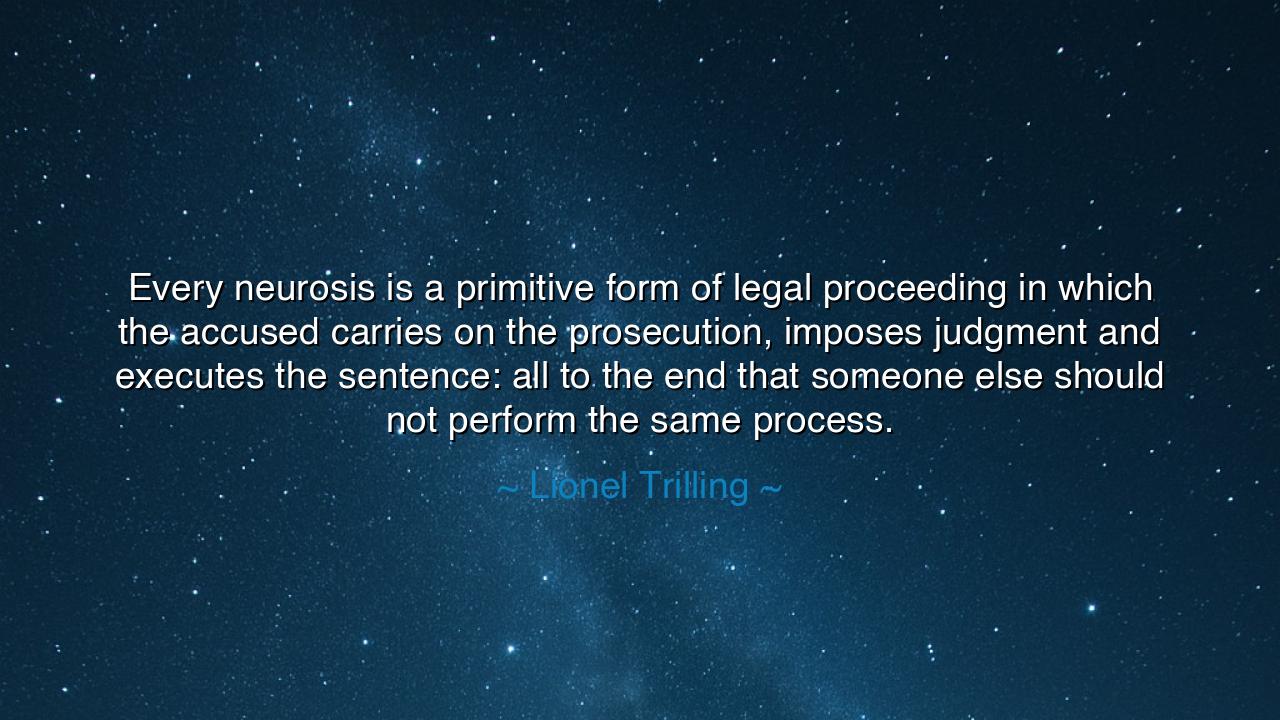
Every neurosis is a primitive form of legal proceeding in which
Every neurosis is a primitive form of legal proceeding in which the accused carries on the prosecution, imposes judgment and executes the sentence: all to the end that someone else should not perform the same process.






Hear the piercing insight of Lionel Trilling, who saw deeply into the hidden struggles of the human mind: “Every neurosis is a primitive form of legal proceeding in which the accused carries on the prosecution, imposes judgment and executes the sentence: all to the end that someone else should not perform the same process.” In this vision, he reveals the tragic theater of the soul, where man becomes at once the judge and the condemned, the executioner and the victim. He shows us how the mind, seeking to avoid the scorn or judgment of others, condemns itself first, in secret, to spare the harsher sentence it fears might come from the world.
The heart of his words lies in the idea that neurosis is self-trial. Within the chambers of the mind, the anxious spirit arranges its own courtroom. The conscience, sharpened by fear and guilt, takes the role of the prosecutor. The self, burdened with shame, becomes the defendant. Judgment is passed without mercy, and punishment is inflicted relentlessly. Yet all this is done in silence, in the hope that by punishing oneself, one will be spared the harsher condemnation of others. It is a desperate shield, a primitive form of justice turned inward, leaving the soul both weary and wounded.
Consider the story of Fyodor Dostoevsky, the Russian novelist who carried a lifelong burden of guilt and punishment. Arrested in his youth and sentenced to death, he was spared at the last moment, but his heart never left the execution yard. In his works, his characters often judge and torment themselves ceaselessly, as in Crime and Punishment, where Raskolnikov condemns himself long before the law can touch him. Here we see Trilling’s truth: the guilty heart prosecutes itself, hoping to master its fate by inflicting judgment before others can.
The wisdom of Trilling also lies in the notion of avoidance. The neurotic person, by condemning himself, seeks to avoid the gaze of society. If he is already punished, perhaps others will see no need to punish him further. Thus, self-reproach becomes a shield, though it is made of chains. It is a form of control, an attempt to manage shame by wielding it against oneself. Yet in this strategy lies tragedy, for the sentence imposed by the self is often harsher than what the world would give. The inner trial knows no appeal, no mercy, no reprieve.
History offers broader examples. Whole cultures, under the weight of defeat or humiliation, have turned judgment inward. After the fall of the Samurai class in Japan, many warriors took their own lives through ritual suicide rather than face the dishonor of judgment by others. Their acts embodied this primitive legal proceeding of the spirit: better to prosecute and punish oneself than to endure the shame of external condemnation. The same pattern echoes through individuals and societies alike: where fear of judgment is great, self-judgment often rushes to take its place.
The lesson for us is profound. To live perpetually in this courtroom of the mind is to waste life in endless trials. Neurosis, left unchecked, robs the soul of peace, for it never allows the case to rest. Yet we must remember: mercy is as necessary as justice. If the mind sets itself as judge, it must also learn compassion. To silence the neurotic trial, one must step beyond fear of others and accept imperfection. For no man or woman is free while they prosecute themselves endlessly in secret.
Therefore, children of tomorrow, take Trilling’s teaching to heart. Do not condemn yourself before the world has spoken. Do not carry out harsh sentences within, in hopes of avoiding the softer judgment of others. Instead, live with courage, accepting that mistakes are part of the human path, and that mercy belongs not only to the divine but to the self. Break down the primitive courtroom within, and replace it with understanding, forgiveness, and growth. In this way, the soul may finally walk free—not as accused, not as condemned, but as one who has learned that justice without compassion is only another name for bondage.






AAdministratorAdministrator
Welcome, honored guests. Please leave a comment, we will respond soon